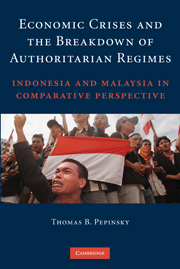 Economic Crises and the Breakdown of Authoritarian Regimes
Economic Crises and the Breakdown of Authoritarian Regimes Published online by Cambridge University Press: 21 January 2010
The literature on economic crises is replete with stories of divided authoritarian regimes and hotly contested adjustment strategies. Crises often prompt reform and at the same time can provide openings for regime change. Few images are more powerful than the People's Power movement in the Philippines, which arose amid economic crisis and political intransigence to push Ferdinand Marcos from power. Financial collapse in Mexico under Ernesto Zedillo foreshadowed the end of one of the world's most durable and highly institutionalized authoritarian regimes. But for every Marcos there is a Pinochet, for every Zedillo a Mugabe and a Mubarak: an authoritarian ruler whose regime clamps down on its political challengers, breaks from the international economic consensus with radical policies, and survives. These failures of reform and political liberalization are normally treated as missed opportunities, nothing more. Yet these cases hold the keys to understanding the links between crises, adjustment, and regime collapse, for they illuminate why crises have one impact in some countries and a different impact in others.
This chapter introduces my argument of how authoritarian regimes grapple with economic crises. The theory holds that, during such crises, coalitional preferences determine adjustment policy and that conflict over adjustment policy determines the likelihood of regime survival. Specifically, when currency and banking crises co-occur, regimes whose support coalitions include both mobile and fixed capital face contradictory demands over adjustment policy, and as a result authoritarian regimes are likely to break down across this political cleavage.
To save this book to your Kindle, first ensure [email protected] is added to your Approved Personal Document E-mail List under your Personal Document Settings on the Manage Your Content and Devices page of your Amazon account. Then enter the ‘name’ part of your Kindle email address below. Find out more about saving to your Kindle.
Note you can select to save to either the @free.kindle.com or @kindle.com variations. ‘@free.kindle.com’ emails are free but can only be saved to your device when it is connected to wi-fi. ‘@kindle.com’ emails can be delivered even when you are not connected to wi-fi, but note that service fees apply.
Find out more about the Kindle Personal Document Service.
To save content items to your account, please confirm that you agree to abide by our usage policies. If this is the first time you use this feature, you will be asked to authorise Cambridge Core to connect with your account. Find out more about saving content to Dropbox.
To save content items to your account, please confirm that you agree to abide by our usage policies. If this is the first time you use this feature, you will be asked to authorise Cambridge Core to connect with your account. Find out more about saving content to Google Drive.